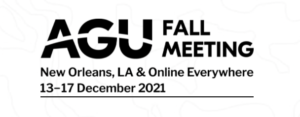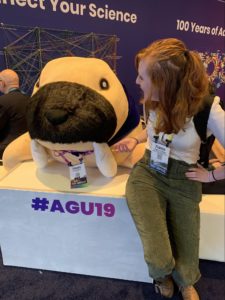
The ESS-DIVE team is excited to present their work and connect with Earth and Environmental Systems Science (ESS) researchers at the upcoming American Geophysical Union (AGU) Fall Meeting 2021. The event will take place in New Orleans, LA and online everywhere 13-17 December 2021. Several ESS-DIVE team members are presenting on relevant topics, ranging from best practices for data curation and publication to approaches to support metadata synthesis. ESS-DIVE will be involved with a total of 6 oral and eLightening presentations.

#AGU21 is the leading forum for advancing Earth and space science and leveraging this research toward solutions for societal challenges. Earth and space science researchers is gathering both in person and virtually for this annual meeting to learn and collaborate around the theme of “Science is Society.” With more than 25,000 individuals from 100+ countries expected to attend representing the global Earth and space sciences, the event will consist of inspiring plenary talks, cutting-edge science presentations and more.Most sessions will be recorded and available to this global researchers, scientists, educators, students, policymakers, partners, science enthusiasts, journalists, and communicators. With in-person and worldwide online participation, attendees will have numerous opportunities to network with government regulators, scientific visionaries, and industry thought-leaders.

- Madison Burrus will present Efforts to Encourage and Incentivize Data Archiving in the Environmental System Sciences during the poster session on Tuesday 14 December from 14:00 – 16:00 PT.
- Joan Damerow will present How do we make interdisciplinary sample data more FAIR (Findability, Accessibility, Interoperability, and Reusability)? on Wednesday, 15 December from 12:51-12:57 PT.
- Dylan O’Ryan is presenting Applying Data Reporting Formats to Open-Source Water Quality Data during the poster session on Thursday, 16 December 2021; 14:00 – 16:00 PT.
- Emily Robles is presenting Bringing more Tropical data to the table through the NGEE-Tropics data archive during the poster session on Thursday, 16 December 2021; 14:00 – 16:00 Pacific
- Joan will also chair three sessions on Connecting Disciplines and Data in Earth and Environmental Synthesis Research: Enabling International and Interdisciplinary Data Discovery, Integration, and Reuse on Thursday, 16 December 2021; 14:00 – 16:00 (poster session), and Friday, 17 December from 7:45 – 9:00 (elightening), 10: 45 – 12:00 PT (oral session).
- Deb Agarwal will present Enabling Citations of Large Numbers of Dataset on Friday December 17 from 07:57 – 08:00 PT.
- Robert Crystal-Ornelas will present Fundamentals for Collaborating on Research Projects Using GitHub on Friday, 17 December 2021 from 07:50 – 08:20 PT. He will also present Data Standards for More Reusable Data in Earth and Environmental Science during the poster session on Friday, 17 December 2021; 14:00 – 16:00 PT.
- Emily Robles will present FAIR Dataset Metadata: An Analysis of Requirements across Environmental Science Data Repositories on Friday, 17 December 2021 from 12:48 –12:53 PT.
- Shreyas Cholia will present Fostering Growth in the ESS-DIVE Repository on Friday December 17 from 14:03 – 14:06 PT.
- Project Partners Pamela Weisenhorn and Kathleen Beilsmith will present Applying Data Standards and Reproducible Workflows To Advance Earth System Science during the poster session on Friday, 17 December 2021; 08:03 – 08:06 Pacific.
ESS-DIVE is enthusiastic about the opportunity to engage in this collaborative and interdisciplinary event. The interactive nature of this event will serve as a platform to share research findings, discuss use cases, and more. The team looks forward to not only sharing their knowledge, but also gaining new insights and experiences.
ESS-DIVE is funded by the Data Management program within the Earth and Environmental Systems Science Division under the DOE’s Office of Science Biological and Environmental Research program and is maintained by the Lawrence Berkeley National Laboratory.